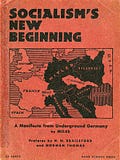Explores “new lefts” from the antifascist 1920s to the anti-establishment 1960s. Features Terry Renaud, assistant instructional professor in social sciences at the University of Chicago.
Episode 1
Discusses the forms of alternative left organizations, György Lukács, 1930s German anti-fascist group Neu Beginnen (New Beginning), sexual liberation and transgression of traditional forms, Neu Beginnen’s role in the Spanish Civil War, World War II’s effect on new leftism, and more.
Episode 2
Picks up during and after WWII in Germany, touching on the “inner exile” experienced by some German intellectuals during the Nazi regime, wartime intelligence work by leftist figures, the formation of the SED in the East, activity among the SPD and CDU in the West, and more.
Episode 3
Focuses on what most people know as “The New Left”, i.e. the new left movements of the 1950s and 1960s. They compare the new lefts of postwar decades vs. those in the prewar years, discuss anti-imperialist conflicts, student movements, anti-colonialism and transnational connections between Western Europe and the so-called Global South, the influence of the civil rights movement in the US, the feasibility of a revolutionary victory over the state in the 1960s, and more.
Episode 4
Discusses the legacy of the 1960s in the American imagination, criticisms of the new left movements of that decade, neoliberalism and the “‘Me Decade”, how the US higher education system denuded new lefts, what the modern left should take from these movements, and more.


